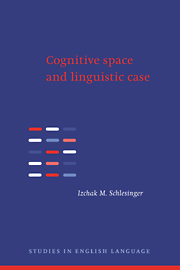1 - Cognitive space
Published online by Cambridge University Press: 20 October 2009
Summary
… the relations are numberless and no existing language is capable of doing justice to all their shades.
William James (1892/1962: 176)Semantic and cognitive categories
This book deals with cases (also called semantic relations or thematic roles) and their relationship with cognition. It is often assumed that cases are conceptual or cognitive categories. Thus Wilkins (1988: 191–92) states that thematic roles “ … are components of the mental representations of objects and concepts.” This view seems to be shared by, inter alios, Nilsen (1973), DeLancey (1982), and Jackendoff (1983).
It is important to be clear about what is being claimed here. On one interpretation, the equation of cases with cognitive categories means only that cases are anchored in cognition, which is tantamount to the truism that language maps meanings into sounds. This, however, is apparently not what Fillmore had in mind when he wrote: “The case notions comprise a set of universal, presumably innate, concepts which identify certain types of judgments human beings are capable of making about the events that are going on around them, judgments about such matters as who did it, who it happened to, and what got changed” (Fillmore, 1968: 24). Here the much more interesting claim is made that case categories exist in cognition independently of language, presumably also prior to language, and that the linguistic system then makes use of these independently existing categories. According to this view, there is a single cognitive–semantic level that is mapped somehow, directly or indirectly, into the level of formal syntactic constructions.
- Type
- Chapter
- Information
- Cognitive Space and Linguistic CaseSemantic and Syntactic Categories in English, pp. 4 - 27Publisher: Cambridge University PressPrint publication year: 1995



